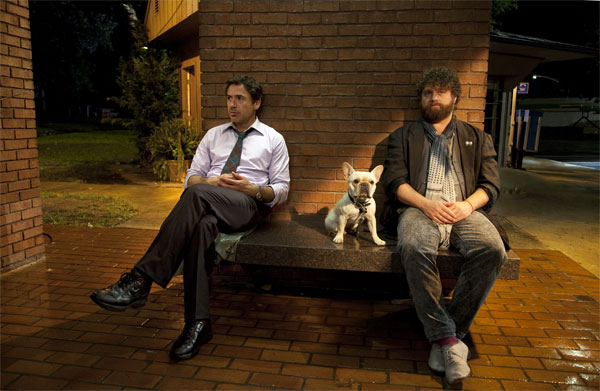
The rules is simple: if a screenplay has three or more people listed in the credit, you’ve got an early warning sign it’s going to be a bad movie. Well, Due Date has four people credited as writers. Four writers, including director Todd Phillips, who should be ashamed for bringing this project to fruition.
Then again, there’s no excuse for talented actors like Robert Downey, Jr. and Zach Galifianakis to get involved with a script this bad unless they are illiterate or really hard up for cash.
The premise of the film is pretty simple: it’s Planes, Trains & Automobiles with some wacky plot twists and a cute dog thrown in for good measure (cute dogs are Hollywood’s catnip for guffaws). Whereas PT&A was fresh and funny, this film is stale and barely amusing.
If you saw the trailer, save your money. You’ve seen the best parts of the film. If you’re a diehard Downey, Jr. or Galifianakis fan, wait for the video. If moviegoers waste good hard-earned cash on claptrap like this, Hollywood will keep serving us more.
It’s time to send a message. I’ve done my part.
I feel like watching Planes, Trains & Automobiles again.
2 responses to ““Due Date” Way Overdue in The Laugh Department”
Your rule of thumb regarding the number of screen writers attached to a film is wrong or at least one where there is sometimes an exception to the general rule, my friend. For example, one of the greatest films of all-time, “Casablanca,” lists at least five people in the credits: Julius J. Epstein (screenplay), Philip G. Epstein (screenplay) and Howard Koch (screenplay). Additional credits go to Murray Burnett and Joan Alison for the play “Everybody Comes to Rick’s.” Casey Robinson is given “uncredited” recognition. I understand numerous other writers worked on the script at various times during its development and the film’s production.
True enough. The rule (Siskel or Ebert’s) is a good one to apply to most movies.
As much as anything, I consider a passel of writers in the credit a harbinger of a turd about to be delivered.
But certainly there are exceptions.
Here’s lookin’ at you, kid.